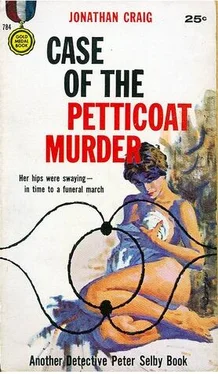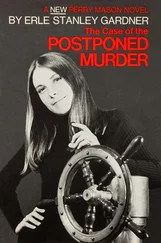“The kid's on it, Pete,” Stan whispered, leaning close to me as he raised his cup. “She's hooked, right through the middle.”
“So I see,” I said.
“So you see what?” the girl said. Her voice was as thin as her body. “What makes you think you've ever been able to see anything? What do you think you are, a universal genius?”
Neither Stan nor I said anything.
“People like you can only look,” she said. “They never really see. They haven't the equipment.”
“You the girl they call Mary C.?” Stan asked.
“There used to be a girl like that, But she's been dead a long, long time.”
“We're police officers, miss,” I said.
“No! You can't be serious. Why, I would never have believed it.”
“Are you Mary C., or aren't you?” I said.
“You know I am,” she said. “Just as I knew you were a cop.” She glanced at Stan. “I'm not so sure about your friend, here. Maybe he's even worse.”
“You acquainted with a man named Johnny Farmer?” I asked.
“I'm acquainted with a lot of Johnnys,” she said. “I even know a few farmers.”
“Would you rather be funny at the station house?” Stan asked mildly.
“I'd rather you dropped dead,” she said. “I know a lot of Johnnys, yes. But no Johnny Farmer.”
“Maybe you'll recognize his description,” I said, and sketched it for her,
“Oh, God,” she said, grimacing. “That one.”
“You know him?” I asked.
“Enough to stay away from.”
“Meaning?”
“The man's insane. I mean really.”
“You with him this afternoon?”
“I'm not with him any afternoon. I saw him in a place around the corner, but that wasn't being with him. I told him to stay the hell away from me.”
“Why so?”
“He makes me sick to my stomach; that's why. I wish to I'd never seen him.”
“He ever give you any presents?”
“Like what, for instance ”
“Earrings, for instance.”
“He never gave me anything.” She paused. “Except a couple of dollars one day.”
“For what?”
She looked at me knowingly. “Nobody's kidding anybody. Let's say I needed a drink.”
“How bad?” Stan asked.
“How bad can it get? That's how bad it was. Bad enough for me to go home with him.”
“Where's that?” I asked.
“I said 'home.' I should have said his pigsty. God, I thought I'd be sick before he even got down to business.”
“What's the address?” I asked.
“I don't know. It's on Barrow Street; I don't know what number.” She coughed her soft, dry addict's cough. “In the basement.”
“Could you pick out the place if we drove you down Barrow in a squad car?”
“How could I forget it?” She paused. “You going to take me in?”
“What for?”
“Since when did cops need 'what fors'?” She coughed again. “I'll tell you the God's truth. If they send me down to Lexington again, it'll kill me. It damn near did the last time.”
“I'm going to assume you mean you're allergic to bluegrass and horses,” I said. “Now—”
“God,” she said, almost fervently. “I thought for sure you were rounding us up again. One more cure would finish me.”
“We're working another street, Mary,” I said. “All we want from you is to show us where Johnny Farmer lives. You feel like a little ride?”
“Just past his house and that's all?”
“That's all.”
“Let's go,” she said, getting to her feet. “I need the air.”
Stan drove and I rode in the back seat with Mary C.
“You said Johnny Farmer was insane,” I reminded her. “How did you mean that?”
“I meant it all the way,” she said. “He's crazy every way there is to be crazy.”
“Maybe not so much crazy as feeble-minded?”
“Both. He's a feeb, for sure, but he's crazy too. I don't know just how to say it. He — he'll do everything. Especially with girls.”
“He a violent man, Mary?”
“He could be. God knows he's big enough. It's just that when he gets near a girl he goes nutso. All he has to do is touch one and he busts his top.”
I found myself wondering whether the M.O. expert at BCI had come up with any promising sex violators.
“He try to choke you, Mary?” I asked. “Anything like that?”
“No.”
“Then what did he do?”
“It isn't what he did. He just did what everybody else does. It's the way he went about it.”
“We understand he has it for you pretty bad.”
“He must have. God knows why. I'm nothing.”
“Apparently he doesn't agree with you.”
“Maybe it's because he's crazy,” she said. “Look at me. I've got no more bust than you have, and my legs are like a couple of broom handles. You see anything about me that'd set off any explosions?”
“This is Barrow,” Stan said, slowing the car. “Is this the block, Mary?”
She turned to peer out the window. “It's farther down,” she said. “There. That little one with the boards over the windows.”
The house she had pointed out was a two-story frame structure, faced with cracking once-yellow stucco. It had obviously been untenanted for some time.
At the corner, Stan turned right and pulled in at the curb about three quarters of the way down the block.
“This far enough away, Mary?” he asked. “If you're worried about somebody seeing you get out, we can drive you somewhere else.”
“What's the difference?” she said. “People see girls like me in police cars all the time.”
“We appreciate this, Mary,” I said as I got out and held the door for her. “I don't think Johnny'll ever give you any more trouble.”
“Will he find out who told him?” she asked. “Not that it makes a hell of a lot of difference, I guess.”
“It makes a difference, all right,” I said. “But he won't find out. Neither my partner nor I will ever remember.”
“Did he do something pretty bad?”
“Bad enough.”
“He'll go to prison?”
“Very probably. If not for one thing, then for another.”
She looked both ways along the darkening street, as if undecided which direction to take.
“Well,” she said, “at least he'll know.” She coughed. “That's more than most of us do.”
“You've kind of lost me, Mary,” I said.
She smiled faintly and turned away in the direction of the river. “Anyone who knows where he's going is lucky,” she said over her shoulder. “He's one in a million.”
Stan Rayder came around the back of the car and stepped up on the sidewalk.
“Well, Pete,” he said, “you ready to take him? Or do you figure we ought to go by the book and ask for some reinforcements?”
“All I ask for is that we're not too late,” I said. “Let's take him now, Stan, and get it over with.”
THE BOARDED-UP little house on Barrow Street looked old enough to have been standing there ever since the yellow fever epidemic of 1791, when Greenwich Village, then an outlying section of the city, had been settled almost overnight by families fleeing the terror at the lower tip of the island. There was no space between the house and the buildings on either side of it, no basement entrance, and nothing to indicate that there had ever been any attempt to pry off the planks nailed across the windows and front door.
“No alley behind these houses,” I said. “We'll have to go through the place next door.”
It was a small stationery store. The proprietor let us in, showed us through the store, and let us out the back door into a small, weed-grown court.
“Thanks,” Stan told him. “We'll take it from here.”
Читать дальше












